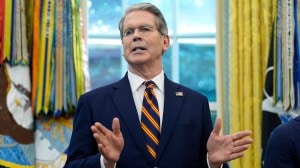UN panel issues new draft,US sticks to transparency demand
AS NEGOTIATORS raced against time to hammer out a deal on climate change,a key UN panel on Tuesday issued a new draft on measures to combat the problem....
AS NEGOTIATORS raced against time to hammer out a deal on climate change,a key UN panel on Tuesday issued a new draft on measures to combat the problem but provided no figures for long-term goal of cutting carbon emissions and financing for poorer countries.
The new draft text,which also did not mention peaking year for greenhouse gas emissions,was issued by one of the two negotiation tracks set up by the 194 nations of the UN Framework Convention on Climate Change (UNFCCC).
The new draft could be seen as a victory for developing nations which,led by Africa,had walked out of the talks on Monday,leading to a temporary suspension in the negotiations.
The talks had resumed after the Chair of COP-15 and Danish Minister Connie Hedegaard assured them that the conference would proceed in a “fully transparent manner and without any surprises.
As he left for Copenhagen,UN Secretary General Ban ki-Moon said in New York that time is running out and there was no time for posturing or blaming.
However,the US indicated that there may be not a climbdown anytime soon,even as heads of state reach the conference,reiterating its demand for adequate transparency from major developing countries on their national carbon-emission-reduction targets.
The US chief envoy on climate change,Todd Stern said key differences remained with major developing economies especially on the issues of monitoring,reporting and verification of actions taken at the national level though some progress had been made.
India,China and other developing countries have ruled out the possibility of international monitoring of their domestic actions.
The need in our view (is) of major developing countries to set forth their intended actions on this agreement and to indicate their resolve to implement them, Stern said.
India’s position is that only the action supported by finances and technology from the developed countries will be up for international scrutiny while all unsupported action will only be assessed by Parliament. It will also be posted through a national communication to the UN perhaps every two years for information purposes only.
Stern,however,said: There are legitimate concerns that people have about how the process runs,about transparency and inclusiveness.
Stern also commented on the brief suspension of talks on Monday following a walkout by the BASIC bloc and African countries,cautioning that any time lost is unhelpful. The clock is ticking, he said.
Having said that,it’s really important that countries focus on the essentials,focus on the pragmatic and focus on getting this done. Process can become your enemy if there is insistence on discussing and going around the process too much, he added.
Despite over a week of negotiations the US,European Union and other developed countries do not accept the information-only stand.
The implementation of action by developing countries that they do set forth in their plan needs to have adequate transparency, Stern said.
Photos



- 01
- 02
- 03
- 04
- 05




























